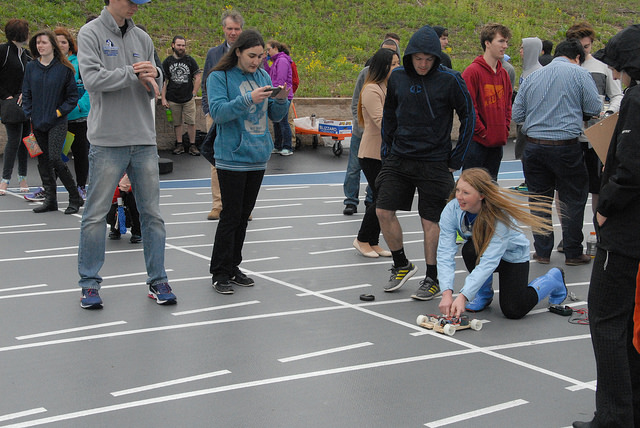 For the past three years, engineering students at Elizabethtown College have planned, built and raced their way to engineering success.
For the past three years, engineering students at Elizabethtown College have planned, built and raced their way to engineering success.
Professor of Engineering and Physics Kurt DeGoede and Assistant Professor Brenda Read-Daily led the class, composed of first-year students, sophomores and technical design minors, as they produced solar-charged cars over the course of the semester. Students were placed in teams and used spring semester class time to construct their vehicles. The project culminated in a race on Scholarship and Creative Arts Day (SCAD) in April.
“It’s really an introduction to engineering design,” DeGoede said. “They’re taking a project from conception to design to fabrication to testing to redesign to competition.”
At the beginning of the semester, teams planned out designs and placed bids on reusable pieces from previous years, such as wheels and motors.
They’re taking a project from conception to design to fabrication to testing to redesign to competition.”
Previously, the first-year project had been to construct a catapult, but DeGoede replaced it with the cars to cover a variety of engineering types, from mechanical to electrical to sustainable. Even so, this did not discourage incoming students.
First-year student Clay Buxton and sophomore Dan Buttorff said they were not too intimidated by the project.
“Since we had all semester, it wasn’t too much,” Buxton said.
Buttorff added that the project was broken up “into little, digestible chunks,” making each aspect easy to navigate.
Even so, the project took about 50 hours to complete, according to Buttorff.
 Teams had more to worry about than the speed of the car. Success of a given group also was measured by distance traveled, cost of the car and reusability of the parts, as well as load carried if teams chose to test the car’s endurance with weights.
Teams had more to worry about than the speed of the car. Success of a given group also was measured by distance traveled, cost of the car and reusability of the parts, as well as load carried if teams chose to test the car’s endurance with weights.
Each team received a budget of $100, which could be used to bid on pieces or purchase new parts.
“It forces them to make a lot of difficult design decisions,” DeGoede said.
Buttorff said his team’s car cost between $55 to $60 and was 85-percent reusable.
Another car engineered by the winning team cost around $30 to build with only $2 of non-reusable materials. Team member Kevin Carman said the most challenging part of building the car was “our grade was affected by placement, and it was just heavily luck-based in the actual competition.” Fortunately, for Carman’s group, the winning team earns a 100 percent on the race-day component of the final project grade. Race day performance accounted for one-sixth of the team’s project grade.
DeGoede said developing this project took the Engineering Department a while to figure out, but he is satisfied with the results. As for advice to incoming students, DeGoede recommends planning ahead for imperfections.
“That’s an advantage,” DeGoede said.

